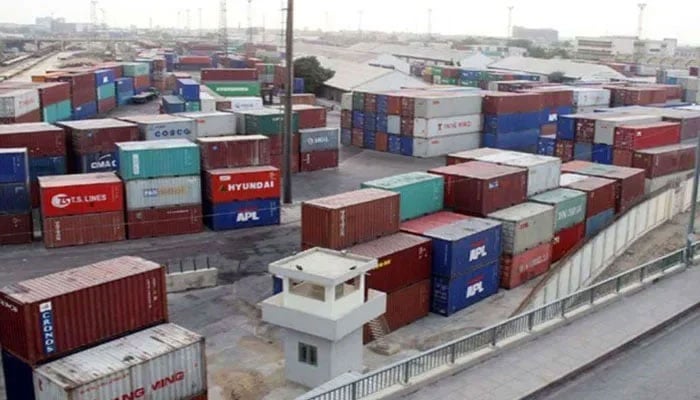Customs rules ‘choke’ cargo transport
KARACHI: The transportation of custom-bonded cargo from the country’s ports has nearly come to a halt following the Customs Department’s introduction of new regulations for escorting transit and transshipment cargo.
Since the implementation of these regulations on January 1, 2025, bonded carriers have transshipped only minimal quantities of cargo. This slowdown occurred after transport operators refused to send vehicles in convoys escorted by customs sepoys, citing the process as time-consuming and economically unviable.
According to a customs department notification, the new standard operating procedures (SOPs) specify designated routes and deployment plans for en-route escorts of transit and transshipment cargo.
“These SOPs aim to streamline the escorting process, ensuring the safety and timely delivery of transit and TP cargo across various routes. The deployment of sepoys is carefully planned to accommodate rest periods, ensuring their readiness for subsequent duties,” the notification stated.
However, industry stakeholders, including bonded carriers, transporters and importers, told The News that the new SOPs were introduced without considering the practical challenges they would create.
For example, a vehicle typically takes 24 hours to reach Sukkur after departing from Karachi. Under the new regulations, a convoy of 14-15 vehicles accompanied by three sepoys would require 48 hours to complete the same journey. “This process is not only time-consuming but also impractical. Vehicles have different rest points, such as hotels and fuel stations. Forcing them to stop at a single location disrupts operations,” they said.
Bonded carrier representatives revealed that cargo movement has stagnated, with only a few consignments transshipped in recent days. The problem intensified after the licence of the tracking company TPL Trakker was revoked on December 31, 2024. TPL Trakker had been responsible for installing trackers on transit and transshipment containers to ensure their security.
The customs department has now assigned two companies to install trackers temporarily for three months, during which time bids will be invited for a long-term contract. The movement of custom-bonded cargo in convoys escorted by customs personnel has also been made mandatory.
Industry insiders noted that the cost of trackers has increased as transporters are now required to install devices from the two new companies. These costs are expected to rise further once a new contract is awarded. Ultimately, the additional expenses will be passed on to consumers.
The customs department did not respond to The News’s requests for comment.
Malik Sher Khan, chief executive of Shaheen Freight Services, told The News that 90 per cent of trade would be adversely affected if custom-bonded cargo continues to be transported through convoys. He explained that most vehicles listed with bonded carriers are not suited for convoy operations on motorways.
He urged the Federal Board of Revenue (FBR) to facilitate trade by ensuring the swift clearance and transportation of custom-bonded cargo, expressing that timely deliveries are critical for promoting trade. “The transport sector employs a significant workforce, and delays can disrupt livelihoods,” he added.
-
 Record Set Straight On King Charles’ Reason For Financially Supporting Andrew And Not Harry
Record Set Straight On King Charles’ Reason For Financially Supporting Andrew And Not Harry -
 Michael Douglas Breaks Silence On Jack Nicholson's Constant Teasing
Michael Douglas Breaks Silence On Jack Nicholson's Constant Teasing -
 How Prince Edward Was ‘bullied’ By Brother Andrew Mountbatten Windsor
How Prince Edward Was ‘bullied’ By Brother Andrew Mountbatten Windsor -
 'Kryptonite' Singer Brad Arnold Loses Battle With Cancer
'Kryptonite' Singer Brad Arnold Loses Battle With Cancer -
 Gabourey Sidibe Gets Candid About Balancing Motherhood And Career
Gabourey Sidibe Gets Candid About Balancing Motherhood And Career -
 Katherine Schwarzenegger Shares Sweet Detail From Early Romance Days With Chris Pratt
Katherine Schwarzenegger Shares Sweet Detail From Early Romance Days With Chris Pratt -
 Jennifer Hudson Gets Candid About Kelly Clarkson Calling It Day From Her Show
Jennifer Hudson Gets Candid About Kelly Clarkson Calling It Day From Her Show -
 Princess Diana, Sarah Ferguson Intense Rivalry Laid Bare
Princess Diana, Sarah Ferguson Intense Rivalry Laid Bare -
 Shamed Andrew Was With Jeffrey Epstein Night Of Virginia Giuffre Assault
Shamed Andrew Was With Jeffrey Epstein Night Of Virginia Giuffre Assault -
 Shamed Andrew’s Finances Predicted As King ‘will Not Leave Him Alone’
Shamed Andrew’s Finances Predicted As King ‘will Not Leave Him Alone’ -
 Expert Reveals Sarah Ferguson’s Tendencies After Reckless Behavior Over Eugenie ‘comes Home To Roost’
Expert Reveals Sarah Ferguson’s Tendencies After Reckless Behavior Over Eugenie ‘comes Home To Roost’ -
 Bad Bunny Faces Major Rumour About Personal Life Ahead Of Super Bowl Performance
Bad Bunny Faces Major Rumour About Personal Life Ahead Of Super Bowl Performance -
 Sarah Ferguson’s Links To Jeffrey Epstein Get More Entangled As Expert Talks Of A Testimony Call
Sarah Ferguson’s Links To Jeffrey Epstein Get More Entangled As Expert Talks Of A Testimony Call -
 France Opens Probe Against Former Minister Lang After Epstein File Dump
France Opens Probe Against Former Minister Lang After Epstein File Dump -
 Last Part Of Lil Jon Statement On Son's Death Melts Hearts, Police Suggest Mental Health Issues
Last Part Of Lil Jon Statement On Son's Death Melts Hearts, Police Suggest Mental Health Issues -
 Leonardo DiCaprio's Girlfriend Vittoria Ceretti Given 'greatest Honor Of Her Life'
Leonardo DiCaprio's Girlfriend Vittoria Ceretti Given 'greatest Honor Of Her Life'




